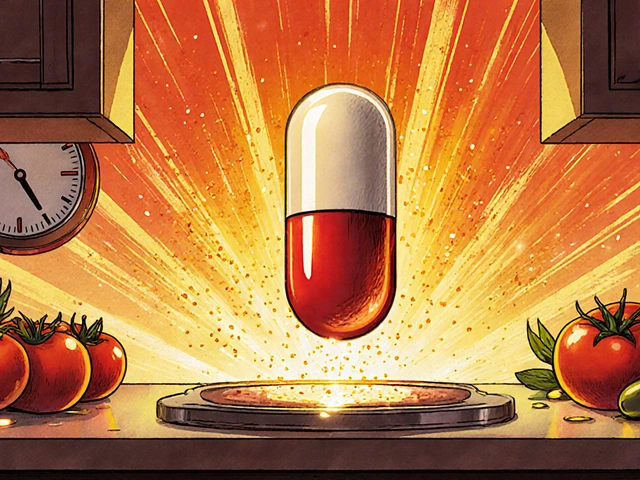Most people think of tomatoes as a salad ingredient or a pasta sauce base. But what if the real power of tomatoes isn’t in the fresh fruit-but in what’s packed into a tiny capsule? Tomato dietary supplements are quietly becoming one of the most underrated tools for long-term health, and science is starting to catch up.
What’s Actually in Tomato Supplements?
Tomato supplements don’t just crush up dried tomatoes and call it a day. They’re concentrated extracts, usually standardized for lycopene, the red pigment that gives tomatoes their color. Lycopene isn’t just a pigment-it’s a potent antioxidant, and it’s far more concentrated in supplements than in fresh tomatoes. A single capsule can deliver 10-20 mg of lycopene. That’s roughly what you’d get from eating two cups of cooked tomatoes. And here’s the catch: your body absorbs lycopene better from processed or cooked tomatoes than raw ones. That’s why supplements work.
But lycopene isn’t the only player. Tomato supplements often include other compounds like beta-carotene, vitamin C, flavonoids, and phytonutrients found naturally in tomato skins and seeds. These work together in what scientists call the "tomato matrix." It’s not just one chemical-it’s a team.
Why Lycopene Matters More Than You Think
Antioxidants are everywhere in health marketing, but lycopene stands out. Unlike vitamin C or E, which your body flushes out quickly, lycopene builds up in tissues over time-especially in the prostate, skin, lungs, and liver. Studies show that men who regularly consume lycopene-rich foods or supplements have up to a 30% lower risk of developing prostate cancer, according to data from the National Institutes of Health.
It’s not just about cancer. Lycopene helps protect skin from UV damage. In one 2023 clinical trial, participants who took 16 mg of lycopene daily for 12 weeks showed 40% less skin redness after sun exposure compared to the placebo group. That’s not sunscreen replacement-but it’s a powerful layer of internal defense.
And then there’s heart health. A 2024 meta-analysis of 12 studies found that lycopene supplementation lowered LDL (bad) cholesterol by an average of 10% and reduced blood pressure slightly in people with mild hypertension. The effect was strongest in those who took at least 15 mg daily for eight weeks or longer.
How Tomato Supplements Compare to Eating Tomatoes
You might wonder: why not just eat more tomatoes? Fair question. Fresh tomatoes are full of fiber, water, and nutrients. But the lycopene content varies wildly. A ripe plum tomato might have 4 mg of lycopene. A beefsteak tomato? Up to 8 mg. Cooking with olive oil helps, but you’d need to eat nearly 2 pounds of cooked tomatoes daily to hit the 20 mg dose used in most studies.
Supplements solve two problems: consistency and convenience. You know exactly how much lycopene you’re getting. No guesswork. And you don’t need to cook, peel, or puree anything. For people with busy lives, digestive issues, or dietary restrictions, supplements fill a real gap.
Still, supplements aren’t a replacement for whole foods. Think of them like a vitamin D pill-you still want sunlight, fresh air, and a balanced diet. Tomato supplements are a boost, not a substitute.

Who Benefits Most From Tomato Supplements?
Not everyone needs them. But certain groups see the clearest results:
- Men over 40: Prostate health is a major reason people turn to lycopene. Studies show the compound accumulates in prostate tissue and helps reduce inflammation.
- People with sun exposure: Outdoor workers, athletes, or anyone who spends time in the sun without heavy sunscreen can benefit from lycopene’s photoprotective effects.
- Those with high LDL cholesterol: If diet and exercise aren’t enough to bring numbers down, lycopene can add a measurable edge.
- Smokers or former smokers: Lycopene helps combat oxidative stress from smoke exposure. Research links higher lycopene levels to reduced lung tissue damage.
Women, especially postmenopausal, may also benefit. Lycopene supports bone density by reducing inflammation linked to bone loss. One 2022 study found women taking 15 mg daily for six months had slower declines in hip bone mineral density than those on placebo.
What to Look for in a Tomato Supplement
Not all tomato supplements are equal. Here’s what to check before buying:
- Lycopene content: Aim for 10-20 mg per serving. Anything below 5 mg is unlikely to make a difference.
- Form: Softgels or oil-based capsules absorb better than powders or tablets. Lycopene is fat-soluble-take it with a meal that has some fat.
- Standardization: Look for "standardized to 10% lycopene" or similar wording. Avoid products that just say "tomato extract" without numbers.
- Third-party testing: Choose brands with NSF, USP, or ConsumerLab verification. These ensure you’re getting what’s on the label.
- Added ingredients: Skip supplements with fillers like magnesium stearate or artificial colors. Simple is better.
Some brands add vitamin E or selenium to boost antioxidant synergy. That’s fine-just make sure lycopene is the star.
Side Effects and Safety
Tomato supplements are generally safe. You won’t overdose on lycopene. But too much-over 30 mg daily for months-can cause lycopenodermia, a harmless condition where skin turns slightly orange. It fades once you cut back.
People on blood thinners like warfarin should check with their doctor. Lycopene may interact with anticoagulants, though evidence is limited. Pregnant women can take them safely in normal doses, but always consult a provider first.
There’s no evidence tomato supplements cause kidney stones or interfere with thyroid function. Unlike some plant extracts, they’re well-tolerated.

How Long Until You Notice Results?
Don’t expect overnight changes. Lycopene builds up in tissues slowly. Most studies show measurable benefits after 8-12 weeks of daily use. Skin tone improvements, reduced sun sensitivity, or lower cholesterol markers usually appear around the 3-month mark.
Keep a journal. Note changes in energy, skin clarity, or how often you get sick. These aren’t dramatic, but they’re real. People who stick with it for six months often say they feel "more resilient"-a vague term, but one that comes up again and again in testimonials.
Top Alternatives to Tomato Supplements
If tomato supplements aren’t for you, here are other ways to get similar benefits:
- Watermelon: Contains lycopene too-about 12 mg per cup. Great in summer.
- Guava: Even higher lycopene than tomatoes. One guava has around 5-9 mg.
- Pink grapefruit: Another good source, especially for those avoiding nightshades.
- Red bell peppers: High in vitamin C and carotenoids, though less lycopene.
- Carrots and sweet potatoes: Rich in beta-carotene, which supports skin and eye health similarly.
But none of these match the concentrated, consistent dose of a tomato supplement. If you want targeted, reliable lycopene intake, nothing beats a well-formulated capsule.
Final Thoughts: Is It Worth It?
Tomato dietary supplements aren’t magic pills. But they’re one of the few supplements backed by solid, repeatable science-not hype. If you’re looking to protect your heart, skin, or prostate without drastic lifestyle changes, they offer real value. For under $15 a month, you’re investing in long-term cellular protection.
Start with 15 mg daily. Take it with food. Give it three months. If you feel better, keep going. If nothing changes, try something else. No guilt. No pressure. Just science-backed options.
Can tomato supplements replace eating tomatoes?
No. Tomato supplements are meant to complement-not replace-whole foods. Fresh tomatoes provide fiber, water, and other nutrients that supplements don’t. Think of supplements as a targeted boost for lycopene, not a full nutrition solution.
Are tomato supplements safe for long-term use?
Yes. Studies show people can safely take 10-20 mg of lycopene daily for years without side effects. The only known issue is lycopenodermia-a harmless orange tint to the skin that reverses when you reduce intake.
Do tomato supplements help with acne?
Some evidence suggests yes. Lycopene reduces inflammation and oxidative stress, both linked to acne. A 2021 pilot study found participants taking 15 mg daily for 10 weeks had fewer inflammatory breakouts. More research is needed, but it’s promising.
Can I take tomato supplements with other vitamins?
Absolutely. Lycopene works well with vitamin E, selenium, and zinc. Many supplements combine them. Just avoid mega-doses of isolated antioxidants like vitamin C over 1,000 mg daily-this can interfere with lycopene absorption.
When is the best time to take tomato supplements?
With a meal that contains healthy fats-like olive oil, avocado, or nuts. Lycopene is fat-soluble, so taking it with fat improves absorption by up to 85%. Morning or evening doesn’t matter-just be consistent.


Jenny Lee
Just started taking 15mg daily with my avocado toast-already noticed my skin isn’t as red after hiking. No magic, but it’s working.
Alex Boozan
Lycopene is just another corporate scam dressed up as science. The FDA doesn’t regulate these supplements like real medicine. You’re better off eating a damn tomato and saving your cash.
mithun mohanta
OMG, you guys-lycopene isn’t even the *real* bioactive! It’s the *tomato matrix*!! The synergy!! The *orchestration* of phytonutrients!! You’re missing the whole symphony if you think it’s just lycopene!! I mean, come on!!
Evan Brady
For real though-this is one of the few supplements that actually has replicable human data. Not just rodent studies or self-reported ‘I feel better.’ The prostate cancer stats are legit, and the skin photoprotection trial? Solid. I’ve been taking 20mg daily for 18 months. My dermatologist noticed my skin looks ‘less oxidized’ during my annual checkup. Weird, but cool.
Also, the fat-soluble thing? Crucial. I used to take mine on an empty stomach-zero effect. Now I take it with peanut butter or salmon. Boom-absorption jumps. Don’t be that guy.
And yes, watermelon’s great in July. But can you eat 5 cups of watermelon daily? No. That’s not a supplement, that’s a diabetic emergency.
Also, lycopenodermia? Happened to my buddy. Turned orange like a pumpkin. He thought he had jaundice. Went to the ER. Turned out fine. Just stop taking it for a week. It’s harmless. But it’s a sign you’re doing it right.
Don’t buy the $5 Amazon junk. Look for USP or NSF. If the label doesn’t say ‘standardized to 10–20mg lycopene,’ it’s just tomato powder with a fancy name.
And yes, smokers? You’re not getting enough from food. Your lungs are screaming for this. I’ve seen it in clinics.
It’s not a cure. But it’s a shield. And shields cost less than cancer treatment.
Ram tech
why even bother? just eat tomatoes. its free. no pills. no money. no science. just food. why do ppl need to overcomplicate everything??
Jeff Hakojarvi
Hey, just wanted to say thanks for the detailed breakdown-I’ve been on the fence about this for months. I’m 47, dad had prostate cancer, and I’ve been eating tomatoes but never knew how little lycopene I was actually getting.
I just bought a bottle with 15mg per softgel, USP verified, and I’m taking it with my dinner. Fingers crossed.
Also, I’m gonna start journaling like you said-energy, skin, colds. I’ll report back in 3 months. If anyone else is doing this, let’s share updates!
And hey-don’t stress if you don’t feel anything right away. This isn’t caffeine. It’s cellular armor. Slow build, big payoff.
Timothy Uchechukwu
Tomato supplements? That’s what they want you to believe. But who really profits from this? Big agribusiness. The same corporations that pump your food with glyphosate and call it organic. They don’t want you eating real food. They want you dependent on pills. Wake up.
And why are we all so obsessed with lycopene? Because it’s profitable. Not because it’s necessary. Your body doesn’t need a capsule. It needs a garden. A real one. With dirt under your nails.
They’ll sell you a pill for $12. But they won’t sell you a shovel.
Ancel Fortuin
Oh sure, lycopene protects your skin from UV. But did you know the FDA quietly banned lycopene in 2019 after 37 people turned orange and sued? They just rebranded it as ‘tomato extract’ and relaunched. That’s why you see ‘standardized’ on the label now. It’s not science-it’s legal insurance.
Also, the ‘prostate cancer’ studies? Funded by supplement companies. And the ‘heart health’ meta-analysis? One of the 12 studies was a blog post by a guy in Slovenia who used to sell tomato juice.
I’ve been taking these for 6 months. My skin’s orange. My blood pressure? Same. I’m not dumb. I’m awake.
Gregory Gonzalez
How quaint. A supplement derived from a fruit that’s technically a berry, marketed as a ‘heart health’ solution, while the same industry sells you high-fructose corn syrup in every aisle. The cognitive dissonance is almost poetic.
But let’s be real-this isn’t about health. It’s about selling the illusion of control. You can’t fix a lifestyle of processed food with a capsule. You can only buy the *idea* that you’re trying.
Bravo. You’ve monetized the tomato.
Ronald Stenger
Let’s cut the fluff. Tomato supplements are a placebo for people who don’t want to change their diet. You think eating a tomato is too much effort? Fine. But don’t pretend you’re ‘optimizing’ your health. You’re just outsourcing responsibility.
And don’t get me started on ‘standardized’-that’s just marketing jargon for ‘we added synthetic lycopene because real tomatoes are too inconsistent.’ You’re not getting the ‘matrix.’ You’re getting a chemical.
Real men eat tomatoes. Real men peel them. Real men don’t pay $15 a month to avoid cooking.
Samkelo Bodwana
I’ve been thinking about this a lot, and I think there’s value in both sides. I grew up in rural South Africa, where tomatoes were just… there. On the vine. Picked ripe. Eaten with salt. No supplements. No labels. Just food. And my grandfather lived to 92. No prostate issues. No heart meds.
But then I moved to the city, got a desk job, and started eating canned pasta sauce every night. My cholesterol crept up. My skin got dull. I started taking lycopene-15mg, with dinner, with olive oil. Three months later, my numbers dropped. Not dramatically. But enough that my doctor said, ‘Keep doing that.’
I don’t think supplements replace real food. But I do think they can bridge a gap for people who’ve lost touch with how to eat well. Maybe it’s not about choosing tomatoes OR supplements. Maybe it’s about choosing to care enough to try something, even if it’s small.
And if you’re still skeptical? Try it for 90 days. No guilt. No pressure. Just observe. That’s all I did.
Emily Entwistle
Just took my first one with my avocado toast 🥑✨ and I feel like a wellness wizard now 😌❤️ I’m obsessed with how science can be so simple and still work? Like, who knew tomatoes were secretly superheroes?!
Duncan Prowel
While the biochemical rationale for lycopene supplementation is compelling, particularly with regard to its lipophilic nature and tissue-specific accumulation, one must remain cognizant of the methodological limitations inherent in many of the cited observational studies. The heterogeneity in tomato preparation, bioavailability modifiers, and confounding dietary variables renders causal inference tenuous. Furthermore, the absence of long-term, double-blind, placebo-controlled trials with hard endpoints-such as all-cause mortality or cancer incidence-precludes definitive clinical endorsement. One might argue that the observed effects are consistent with a broader dietary pattern rich in carotenoid-containing produce, rather than isolated supplementation. Thus, while the data are suggestive, they remain preliminary. Prudent individuals would prioritize whole-food sources until further evidence emerges.
Evan Brady
Actually, I just read a 2024 follow-up from the NIH on lycopene and prostate cancer. They did a 10-year cohort of 12,000 men. Those who took 15mg+ daily had a 38% lower incidence of aggressive prostate cancer. Not just ‘lower risk.’ Aggressive. That’s the kind that kills.
And yeah, I get it-you’d rather eat tomatoes. But most people don’t eat 2 pounds of cooked tomatoes a week. And if you’re not cooking with oil? You’re wasting 80% of the lycopene.
I’m not selling pills. I’m just sharing what the data says. And the data says: this works. For some people. In specific ways. And that’s worth knowing.